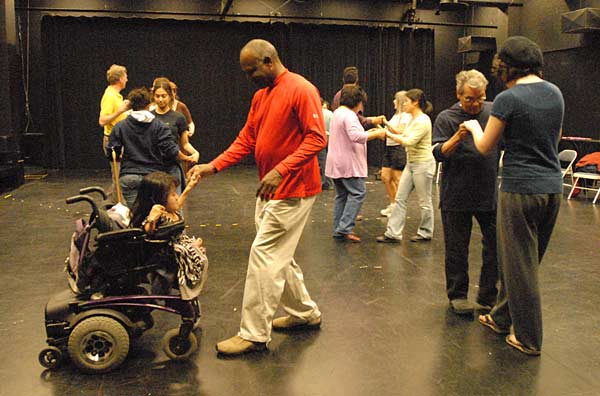 Students in an interactive-theater class warm up in pairs. (Peg Skorpinski photo)
Students in an interactive-theater class warm up in pairs. (Peg Skorpinski photo) BILD-ing toward a more welcoming campus
The Berkeley Initiative for Leadership on Diversity reaches farther in year two
| 11 December 2008
BERKELEY — Now in its second year, the Berkeley Initiative for Leadership on Diversity (BILD) will fund five staff-initiated projects in 2008-09, advancing diversity on fronts ranging from LGBT awareness through opportunities for African American staff and beyond.
Chancellor Birgeneau launched BILD in 2006 in conjunction with the Berkeley Division of the Academic Senate. This year, he has again earmarked $200,000 for BILD in keeping with his priority to promote equity, diversity, and inclusion for the campus's faculty, students, and staff.
BILD's request for proposals this past summer required that each project satisfy a single priority — partnership, access, inclusion, or staff development. Most applicants, however, sought to address all four areas.
Although the number of projects funded this year is down from last year, "this year's projects are more far-reaching, so more people will benefit," says Sidalia Reel, director of staff diversity initiatives. Reel notes that the intent last year had been to fund four or five projects, but the BILD selection committee ended up funding 10. Funding levels vary, as do the amounts of money applicants request.
For its second year, the BILD steering committee received 16 applications. Eight groups were invited to submit more detailed applications for final consideration. Three of the five 2008-09 BILD projects are new, and two others will build and expand efforts begun last year. Although each of the projects will try to foster diversity and inclusiveness in different ways, each leadership team shares the chancellor's commitment to making Berkeley a more welcoming place for all.
Interactive Theater Project: Developing awareness on stage
The Interactive Theater Project (ITP), which involves faculty and staff from the Department of Theater, Dance, and Performance Studies, the Graduate Diversity Program, Staff Equity and Diversity Services, the Campus Climate and Compliance Office, and the Center for Workforce Development, received a second year of funding to build upon its initial success.
 ITP company member Joe Griffin practices vocal exercises. (Peg Skorpinski photo)
ITP company member Joe Griffin practices vocal exercises. (Peg Skorpinski photo) Last spring, a group of staff and students audited Interactive Theater: Acting for Social Change, learning to use role-playing to raise awareness of social issues. Together they developed scripts, fine-tuned them, learned parts, and set up and blocked scenes. "In this process, they formed an incredible intimacy with each other," says ITP facilitator Allan Creighton, a health educator specializing in social justice and violence prevention.
This fall, ITP staged six performances that addressed workplace issues such as sexual and gender harassment, racial discrimination in hiring, and disability. After each hourlong performance, Creighton and other facilitators put the campus audience through its paces, asking them to ponder how they would handle such scenarios in their own workplace. The audience interacted with the actors to help pinpoint the social-justice and legal issues illustrated.
"This is not just a workshop — it's about making change in the workplace," says Edith Ng, a project coordinator and campus manager of staff Equal Employment Oppotunity compliance. "These are difficult issues to discuss in the workplace, and ITP provides a venue."
In ITP's second year, the current troupe will to develop new scripts and new members will join the company. A pilot of the sexual-harassment session — which fulfills the state-mandated sexual-harassment-prevention training for supervisors and managers — will remain a staple of its program.
"We're going to explore different ways to deliver the workshops," says Ng. "We're still figuring out how to create a sustainable model [for ITP], but we know it's a powerful tool."
Recreational Sports: Real-world lessons
Learning to Lead, a program developed by Recreational Sports staff, supplements existing training for the unit's more than 500 student-employees. It focuses on developing leadership skills and building relationships in a multicultural environment. Rec Sports staff will assist with training and serve as mentors, and guest speakers will address special topics in diversity.
Learning to Lead uses a less conventional, more cumulative approach than a two-hour training session, says Brigitte Lossing, associate director of campus recreation and a project leaders. Students will be asked to reflect on their experiences in journals, and turn to staff mentors when they need another perspective.
In their work, student-employees at Rec Sports encounter a diverse public. The BILD-funded semester-long training is designed to enhance their ability to relate to others by practicing communication, conflict resolution, and other skills. The student-employees will be in a work environment that's "like a little laboratory where they can see how what they learn works," says Lossing.
She observes that for some 17-year-old students coming to Berkeley, the diverse communities on and off campus can be jarring. Such students "might benefit from the opportunity to learn how being in a multicultural environment is a great thing, rather than . . . being fearful of it," says Lossing. When the student leaves Berkeley, "he will take that knowledge and move out into the world as a fuller, more multi-dimensional person," she says.
Lavender PAÍS: Training the LGBT trainers
Lavender PAÍS (Partnership, Access, Inclusion, Staff development) was launched with BILD funding last year. It engaged in networking and coalition- and community-building activities to raise LGBT visibility on campus. The group's monthly events and new website gave the project a campus presence. Meeting those goals "went a long way to making the campus feel much more welcoming to LGBT community members," says Sharon Page-Medrich, one of the Lavender PAÍS team leaders.
This year, the program received support for a new project to train a diverse group of campus volunteers as on-call trainers for campus units on LGBT workplace issues. Selected trainees will be a diverse cohort based on — although not limited to — factors such as job classification, workplace location, LGBTQA identification, race and ethnicity, and gender identity.
Lavender PAÍS's partner in this undertaking, Out & Equal Workplace Advocates, will consult with project leaders on two train-the-trainer workshops, one focusing on LGB workplace issues and the other on transgender issues. The goal is to train four dozen people in the workshops during Spring and Fall 2009. "We hope these workshops will become models for other UC campuses as well as other universities and colleges," says Page-Medrich.
The group also plans to develop an online module on LGBT workplace issues available to campus managers, supervisors, and staff that can be taken as a standalone or in conjunction with more formal training, says Page-Medrich.
Ujima Career Development and Leadership Institute: Deconstructing infrastructure
"How do people 'work' relationships and connections on this campus?" asks Cara Stanley, a leader of the Ujima Career Development and Leadership Institute, a program initiated by the campus's Black Staff & Faculty Organization. "If you're shy and don't know that on this campus relationships are everything, you won't get access to the power structure and the goodies."
"Ujima" is a Kwanzaa principle that urges community members to take collective responsibility for one another. The project aims to help demystify career advancement at Berkeley for black staff, targeting represented staff who may feel stuck in their positions and employees who need mentoring to move up to the director level.
During Ujima's four-day training next spring, 25 staff members will assess their current skills, and then create career-development plans with the help of a professional coach. "Asking soul-searching questions will be part of the training," says Stanley. "Often people know what they don't want but can't articulate what they actually want, outside of wishing to make more money."
The Ujima team will help participants become a support network for one another and build and update their skills to meet campus needs. It will also assemble a panel of African American staff who have risen through the ranks to share the stories behind their success.
STARS: Meeting colleagues and building alliances
With BILD support, the School of Public Health last year launched STARS (Staff Talent and Role Sharing), a project that matches junior and senior staff from the school's 47 units with to create alliances and explore career possibilities. In the first year, 58 employees participated, representing 27 units within the school, in six different buildings, and with 19 payroll classifications, ranging from Administrative Assistant I to assistant dean.
"We wanted to provide an opportunity for people to be exposed to other environments" within the school, says project leader Seana Kelly, a grants administrator who runs two postdoctoral programs. Feedback from the program's participants was extremely positive. STARS helped one staffer "see a bigger picture, or a more holistic view of SPH." Another appreciated the opportunity to "get familiar with the overall fit of others under the SPH umbrella," and better understand a co-worker's job.
Next year STARS will expand its program in Public Health and will host information sessions in the spring for staff from other units looking to create similar programs. "We've already created the bones" of the program — registration forms, FAQs, surveys, and a website design — says Kelly, noting that other groups won't have to start from scratch.
"We think STARS has been successful because it was conceived by SPH staff for other SPH staff," Kelly says. "Knowing it wasn't something mandated by our dean's office or implemented by HR got more people involved."
For more information, visit diversity.berkeley.edu/BILD.

